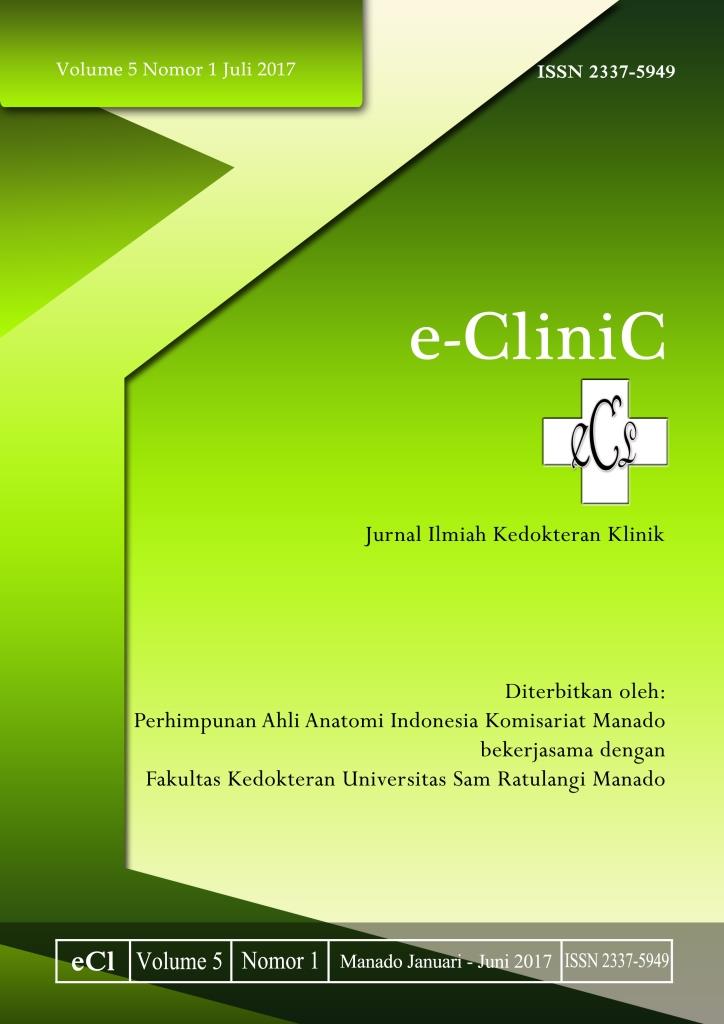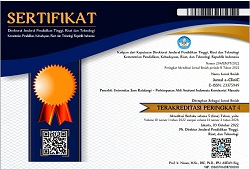Profil Clinical Scales Minnesota Multiphasic Personality Inventory-2 (MMPI-2) Adaptasi Indonesia pada Komunitas Public United not Kingdom (punk) di Kawasan Megamas Manado
DOI:
https://doi.org/10.35790/ecl.v5i1.15812Abstract
Abstract: Punk community is a social phenomenon that is prevalent in major cities in Indonesia. Members of the punk community are of a certain opinion that they have discovered their concepts and their thoughts on the highlighted unique and distinctive style. This study was aimed to obtain the status of mental health among the punk community based on Minnesota multiphasic personality inventory-2 (MMPI-2) Indonesia adaptation in order to detect any possible mental disorders. This was a descriptive observational study with a cross sectional design. The study population included members of the punk community at Megamas Manado aged ≥18 years. The results showed that of 30 respondents, the majority were males (86.67%), aged 20-39 years (83.33%), parents worked in private sectors (43.33%), did not have a certain job (73.33%), three siblings (43.33%), stayed in Manado (16.67%), senior high school graduated, and freedom as the reason to join the community (63.33%). Distribution of the MMPI-2 clinical scales Indonesia adaptation obtained a scale with high t-scores, as follows: Pd (40%), D (16.67%), MF (6.67%). Hy G.33%), and Si (3.33%). Conclusion: There were three clinical scales with the highest psychopathology: schizophrenia, paranoia, and psychasthenia. The majority were males, senior high school graduated, and stayed in Manado.
Keywords: punk community, profile, clinical scales, MMPI-2 Indonesian adaptation.
Abstrak: Komunitas Punk merupakan sebuah fenomena sosial yang tengah mewabah di seluruh kota-kota besar di Indonesia. Generasi muda yang tergabung dalam komunitas punk merasa telah menemukan konsep dan pemikiran terhadap gayanya yang unik dan khas. Penelitian ini bertujuan untuk mendapatkan status kesehatan mental anggota komunitas punk berdasarkan clinical scales Minnesota multiphasic personality inventory-2 (MMPI-2) adaptasi Indonesia sebagai deteksi adanya kemungkinan gangguan mental. Jenis penelitian ialah deskriptif observasional dengan desain potong lintang. Populasi penelitian ialah anggota komunitas Punk di kawasan Megamas Kota Manado yang berusia >18 tahun ke atas. Hasil penelitian mendapatkan dari 30 responden komunitas Punk, distribusi anggota berdasarkan sosio-demografik terbanyak ialah: laki-laki (86,67%), usia 20-39 tahun (83,33%), pekerjaan orang tua di bidang swasta (43,33%), mempunyai pekerjaan tidak tetap (73,33%), bersaudara tiga orang (43,33%), beralamat di kota Manado (76,67%), pendidikan terakhir SMA (83,33%), dan alasan bergabung pada komunitas Punk karena menginginkan kebebasan (63,33%). Distribusi clinical scales MMPI-2 adaptasi Indonesia memperlihatkan skala dengan t-skor yang tinggi dengan persentase tertinggi hingga terendah sebagai berikut: Sc (90%), Pt (80%), Pa (80%), Ma 73,33%), Hy (46,67%), Pd (40%), D (16,67%), Mf (6,67%), Hy (3,33%), dan Si (3,33%). Simpulan: Terdapat tiga clinical scales yang memiliki psikopatologi tertinggi yaitu: schizophernia, paranoia, dan psychastenia. Mayoritas responden berjenis kelamin laki-laki, berpendidikan terakhir hingga SMA, dan beralamat tempat tinggal di Manado.
Kata kunci: komunitas Punk, MMPI-2 adaptasi Indonesia
Downloads
How to Cite
Issue
Section
License
COPYRIGHT
Authors who publish with this journal agree to the following terms:
Authors hold their copyright and grant this journal the privilege of first publication, with the work simultaneously licensed under a Creative Commons Attribution License that permits others to impart the work with an acknowledgment of the work's origin and initial publication by this journal.
Authors can enter into separate or additional contractual arrangements for the non-exclusive distribution of the journal's published version of the work (for example, post it to an institutional repository or publish it in a book), with an acknowledgment of its underlying publication in this journal.
Authors are permitted and encouraged to post their work online (for example, in institutional repositories or on their website) as it can lead to productive exchanges, as well as earlier and greater citation of the published work (See The Effect of Open Access).







